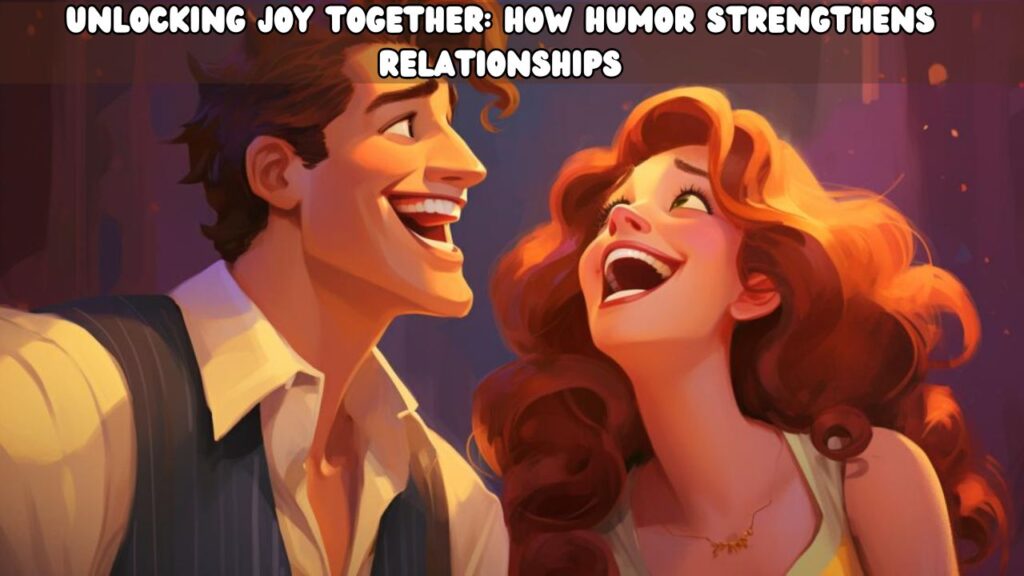In my years as a relationship therapist, I’ve witnessed firsthand the transformative power of humor in relationships. It’s not just about cracking jokes or making each other laugh; it’s about creating a shared world filled with joy, understanding, and emotional connection. In this article, we’ll explore the multifaceted role of humor in relationships and why laughter really can be the best medicine.
The Magic of Laughter
Laughter is a universal language, transcending cultural and linguistic barriers. It’s a spontaneous expression of joy, a sign of happiness, and often, an indicator of comfort. In relationships, laughter serves as a powerful tool, creating moments of connection that are both simple and profound. When we laugh with our partner, we’re doing more than just enjoying a joke; we’re sharing a piece of ourselves, revealing what amuses and delights us. This shared laughter can become the thread that weaves intimacy and understanding into the fabric of our relationship.
Why This Matters in Love
In the realm of love, humor holds a special place. It’s not just about lightening the mood or easing tension; it’s about building a deeper bond with your partner. Studies have shown that couples who laugh together report higher levels of satisfaction in their relationship. They tend to navigate conflicts more effectively and maintain a stronger connection over time. Humor can act as a buffer against stress and conflict, helping couples to maintain their relationship during difficult times. It’s a sign of compatibility and shared perspective, a way for partners to say, “I see the world in a similar way.”
Setting the Tone for Our Discussion
As we delve into the role of humor in relationships, I invite you to reflect on your own experiences. Think about how humor has played a part in your relationships, how it has helped you connect with your partner, and times when it may have been a source of misunderstanding. Our discussion will not just highlight the joys and benefits of humor but also address the nuances and complexities that come with it. By understanding the many facets of humor in relationships, we can learn to use it as a tool for building stronger, more resilient, and more joyful connections with our loved ones.
The Science Behind Laughter and Bonding

In understanding the role of humor in relationships, it’s enlightening to delve into the science behind laughter and bonding. The benefits of laughter are not just anecdotal; they are deeply rooted in our neurology and social psychology.
Neurological Effects of Laughter
Laughter triggers a cascade of positive neurological changes. When we laugh, our brain releases a cocktail of hormones and neurotransmitters, such as endorphins, dopamine, and oxytocin. Endorphins act as natural painkillers and mood elevators, reducing stress and enhancing pleasure. Dopamine, often associated with the reward centers in the brain, creates feelings of enjoyment and reinforcement, motivating us to continue the behavior. Oxytocin, known as the ‘love hormone,’ plays a crucial role in social bonding, increasing trust and empathy among individuals. This cocktail of chemicals not only makes us feel good but also strengthens our connections with those we share laughter with. It’s as if every chuckle and giggle physically draws us closer together.
Laughter as a Social Glue
Beyond its neurological impact, laughter serves as a powerful social glue. From an evolutionary perspective, laughter has been a tool for bonding and building community. In relationships, shared laughter creates a sense of belonging and mutual understanding. It helps synchronize the emotions of partners, fostering a sense of unity. When couples laugh together, they are often sharing more than just a joke; they are sharing perspectives, values, and experiences. This act of sharing creates a strong foundation for trust and cooperation, essential elements in any healthy relationship. Laughter also serves as a social signal, communicating to others that we are approachable, friendly, and open to connection, thereby enhancing our social interactions and deepening our relationships.
Emotional Benefits of Shared Humor
Shared humor has a profound impact on the emotional climate of a relationship. It acts as a buffer against stress and conflict. When couples navigate difficult times, humor provides a way to view challenges with a lighter heart, often offering a fresh perspective and easing tension. It’s not about ignoring problems or trivializing serious issues, but rather about maintaining a balanced perspective where joy and levity have a place even in tough times. Additionally, shared laughter creates a reservoir of positive emotions. Couples who laugh together accumulate a wealth of joyful memories and positive associations, which can serve as a buffer in times of disagreement or stress. This emotional bank account is invaluable in fostering long-term satisfaction and resilience in relationships.
Understanding the science behind laughter and bonding gives us a clearer picture of why humor is such a potent force in relationships. It goes beyond mere enjoyment, playing a critical role in our neurological well-being, social interactions, and emotional health.
Humor in the Early Stages of a Relationship

In the initial phases of a relationship, humor plays a particularly pivotal role. It’s a period where impressions are formed, and bonds begin to develop. Let’s explore how humor can break the ice, build rapport, and contribute to attraction.
Breaking the Ice with Laughter
The start of any relationship, romantic or otherwise, often comes with a certain level of nervousness and uncertainty. Humor is an incredible icebreaker. A shared laugh can immediately reduce tension and create a comfortable atmosphere where two people feel at ease with each other. It’s a way of saying, “I’m approachable and friendly.” When someone uses humor effectively at the beginning of a relationship, it can disarm fears, encourage openness, and pave the way for deeper, more meaningful interactions. Remember, the goal isn’t about being a comedian; it’s about showing your willingness to enjoy and appreciate the lighter side of life together.
Building Rapport Through Jokes
As the relationship progresses from the initial encounter, humor becomes a tool to build rapport. When two people find humor in the same things, it often indicates that they share similar perspectives or values. This common ground can be the foundation upon which a strong relationship is built. Jokes and playful teasing (when done respectfully) can accelerate the feeling of closeness and familiarity. It’s important, however, to be mindful of the other person’s reactions and boundaries. The aim is to create a bond, not to offend. In this stage, humor is less about the content of the jokes and more about the shared feeling of joy and the mutual enjoyment of each other’s company.
The Role of Playfulness in Attraction
Playfulness is an often underrated aspect of attraction. In the dance of romance, those who can engage in lighthearted, playful banter often find themselves more successful in capturing the interest and affection of their potential partners. Playfulness injects vitality and energy into interactions, making them more memorable and enjoyable. It signals to the other person that you are relaxed, confident, and capable of enjoying the moment. Additionally, a playful attitude in the early stages of a relationship can set the tone for a dynamic and engaging long-term partnership. It creates a space where both individuals feel free to express themselves authentically and creatively.
In the delicate early stages of a relationship, humor is more than just a way to share a laugh; it’s a vehicle for connection, a builder of rapport, and a vital element in the chemistry of attraction. Understanding and utilizing humor can be instrumental in forming strong, lasting bonds.
Deepening Connections: Humor in Long-Term Relationships

In the journey of a long-term relationship, the role of humor evolves and becomes integral in nurturing and deepening the bond between partners. Let’s explore how laughter can help navigate stress, rekindle joy and romance, and act as a tool for resilience.
Navigating Stress with Laughter
Long-term relationships inevitably encounter stress, whether it’s from external sources like work or internal challenges within the relationship itself. Humor can be a remarkable coping mechanism during these times. It allows couples to take a step back and view their challenges with a lighter heart, providing a much-needed break from the seriousness of the situation. This doesn’t mean using humor to avoid addressing problems, but rather using it to create a positive atmosphere where solutions can be found more easily. Laughter in the face of stress fosters a sense of togetherness, a feeling that ‘we’re in this together and can still find moments of joy, even here.’
Rekindling Joy and Romance
As relationships mature, the initial excitement and novelty can fade, making way for routine and familiarity. Here, humor plays a vital role in rekindling joy and romance. Sharing a laugh, indulging in playful activities, or simply enjoying a humorous show together can reignite feelings of joy and affection. Humor can bring back the light-heartedness of the relationship’s early days, reminding partners of the fun and playful aspects that initially attracted them to each other. It’s about finding humor in the day-to-day, appreciating the quirks of your partner, and not taking life too seriously all the time. This approach can breathe new life into the relationship, keeping the flame of romance alive.
Humor as a Tool for Resilience
In long-term relationships, resilience is key to overcoming the inevitable ups and downs. Humor is a powerful tool in building this resilience. It helps in maintaining a positive outlook, even in difficult times. Couples who can laugh together, especially during hardship, often find it easier to bounce back from challenges. This shared laughter creates a buffer against despair and helps maintain a hopeful perspective. Moreover, humor can provide a sense of perspective, allowing couples to see beyond the immediate difficulties and understand that tough times are often temporary. By incorporating humor, partners can foster a resilient bond, one that is capable of withstanding the tests of time.
In long-term relationships, humor takes on a deeper significance. It becomes a vital element in navigating stress, rekindling romance, and building resilience. Understanding and consciously integrating humor into daily interactions can significantly enhance the strength and quality of the relationship.
Overcoming Conflicts with a Touch of Humor

Conflict is an inevitable part of any relationship, but the way couples manage it can make a world of difference. Introducing humor into this equation can be delicate yet profoundly effective. Let’s explore how humor can be used in difficult conversations, the balance between sensitivity and levity, and the healing power of shared laughter.
Using Humor in Difficult Conversations
When navigating tough discussions, humor can be a valuable tool, but it must be used judiciously. The aim is not to make light of serious issues or to deflect, but to create an atmosphere where tension is diffused, and communication can flow more freely. A well-timed joke or a playful comment can break a cycle of negativity, helping to reset the conversation’s tone. It can act as a reminder that, despite the conflict, the foundation of love and mutual respect still exists. However, it’s crucial to gauge the situation and the partner’s mood; if the timing or type of humor feels off, it can backfire. The key is to use humor in a way that eases tension without trivializing the other person’s feelings or concerns.
Balancing Sensitivity and Levity
Striking the right balance between being sensitive and injecting levity is crucial in conflict resolution. The goal is to acknowledge and validate each other’s feelings while also allowing room for lightness. This balance prevents conversations from becoming too heavy or overwhelming, which can lead to disconnection or shutdown. Couples need to develop a mutual understanding of when and how humor is appropriate in their interactions, especially during conflicts. This understanding can only be built through continuous communication and a deep awareness of each other’s emotional cues. When done correctly, this balance allows for both partners to feel heard and respected, while also keeping the overall mood constructive and hopeful.
The Healing Power of a Shared Laugh
In the aftermath of a conflict, a shared laugh can be incredibly healing. It acts as a signal that, despite the differences, the bond remains strong. Laughter can serve as a bridge, reconnecting partners after a period of emotional distance. It’s a non-verbal affirmation of love and a reminder of the joy and camaraderie at the heart of the relationship. A shared laugh post-conflict can also be a form of reconciliation, a way of saying, “We’ve been through a tough time, but we can still find joy together.” This shared experience of joy can help dissolve lingering tensions and reinforce the resilience and strength of the relationship.
Incorporating humor into conflict management requires sensitivity, timing, and a deep understanding of your partner. When used thoughtfully, humor can not only diffuse tension but also pave the way for healing and reconnection. It’s about finding that sweet spot where laughter becomes a tool for empathy, understanding, and ultimately, reconciliation.
Creating a Shared Sense of Humor

A shared sense of humor is a unique and intimate aspect of a relationship, enhancing connection and understanding. Let’s delve into how couples can develop this shared humor through inside jokes, respecting boundaries, and fostering a playful environment.
Developing Inside Jokes
Inside jokes are a secret language between partners, symbolizing shared experiences and private understandings. They are not just about the content of the joke but represent a shared history and intimacy. To develop these, pay attention to the experiences, mishaps, and idiosyncrasies that naturally occur in your relationship. Highlighting and playfully exaggerating these moments can turn them into a source of ongoing humor. Remember, the key to a good inside joke is that it’s a shared and mutually enjoyable experience. It should feel like a private wink or nudge that says, “We have our unique world.”
Respecting Boundaries in Humor
While humor is a wonderful tool for connection, it’s essential to navigate it with respect for each other’s boundaries. What is hilarious to one person might be offensive or hurtful to another. Open communication about what types of humor are appreciated and what are off-limits is crucial. This understanding is particularly important when joking about personal sensitivities or areas of vulnerability. Respecting these boundaries not only prevents discomfort but also builds trust. It shows that you value your partner’s feelings and are committed to maintaining a safe, respectful environment for your relationship to flourish.
Fostering a Playful Environment
A playful environment is a fertile ground for humor to thrive. This doesn’t mean turning your life into a comedy show but rather adopting a light-hearted approach to daily life. Encourage playfulness by being spontaneous, engaging in fun activities together, or even just approaching mundane tasks with a sense of humor. This atmosphere of playfulness invites laughter and eases the pressures of everyday life. It allows both partners to let their guard down, be themselves, and enjoy each other’s company in a relaxed and joyful manner. Such an environment not only nurtures a shared sense of humor but also strengthens the overall bond of the relationship.
Creating a shared sense of humor is about more than just making each other laugh; it’s about building a unique language that deepens your connection and enriches your relationship. By developing inside jokes, respecting boundaries, and fostering a playful atmosphere, couples can enhance their communication, deepen their understanding of each other, and add a joyful dimension to their partnership.
Practical Tips to Incorporate More Humor

Incorporating humor into a relationship doesn’t have to be a daunting task. In fact, it can be seamlessly integrated into daily life. Let’s look at some practical ways to weave humor into your everyday interactions, enhance your communication with a light-hearted touch, and learn from humorous experiences.
Everyday Humor Practices
Incorporating humor into your daily routine can be simple and subtle. Start with smiling and laughing more yourself; it’s contagious. Share a funny anecdote from your day or a light-hearted observation. Watch a comedy show together or play a humorous game. Even in mundane tasks, try to find a moment of levity—maybe dance while doing the dishes or make a game out of grocery shopping. These small injections of humor can dramatically shift the energy of your day-to-day life, making the routine more enjoyable and your relationship more vibrant.
Humor in Communication
Using humor in communication is about timing and context. A well-placed joke or playful comment can turn a routine conversation into an enjoyable exchange. It can also be a gentle way to broach a difficult subject or to offer constructive criticism without causing defensiveness. However, it’s important to be attentive to how your partner is receiving your humor. If they’re not in the mood for jokes, it’s crucial to switch gears and offer the kind of communication they need at that moment. Humor should always be a bridge to better understanding, not a barrier.
Learning from Humorous Experiences
Every couple has moments where things don’t go as planned, leading to unexpected, often humorous outcomes. Instead of getting frustrated, try to find the humor in these situations. Reflect on these moments with a light-hearted perspective and use them as a source of laughter in the future. This approach not only makes for good stories but also teaches resilience in the face of life’s inevitable hiccups. Learning to laugh at ourselves and our mistakes is a healthy way to keep things in perspective and strengthen our bond.
Integrating more humor into your relationship can be a delightful and enriching process. By incorporating everyday humor practices, using humor thoughtfully in communication, and learning from humorous experiences, couples can enhance their connection and enjoy a more joyful and resilient relationship. Remember, humor is a journey, not a destination, and it’s about enjoying the process together.
Dr. Seraphina Hart, PhD, is a relationship therapist with over two decades of experience in the field of psychology and human behavior. With a rich academic background from Stanford University, she has an in-depth understanding of the complexities of interpersonal relationships. Dr. Hart's journey began with a deep fascination with the human mind and how it forms emotional connections, leading her to specialize in relationship therapy.
Her compassionate approach and unique methodology are informed by her extensive study of various therapeutic modalities, including Cognitive Behavioral Therapy (CBT), Emotionally Focused Therapy (EFT), and mindfulness techniques. Dr. Hart believes in the power of empathy and understanding in healing and transforming relationships. With her guidance, clients learn to navigate their emotions, communicate effectively, and foster a deep sense of self-awareness.




You may like
Balancing Career and Relationship Goals: A Guide to Harmonious Living
The Impact of Childhood Experiences on Adult Relationships
Setting Boundaries in Romantic Relationships: A Path to Healthy Love